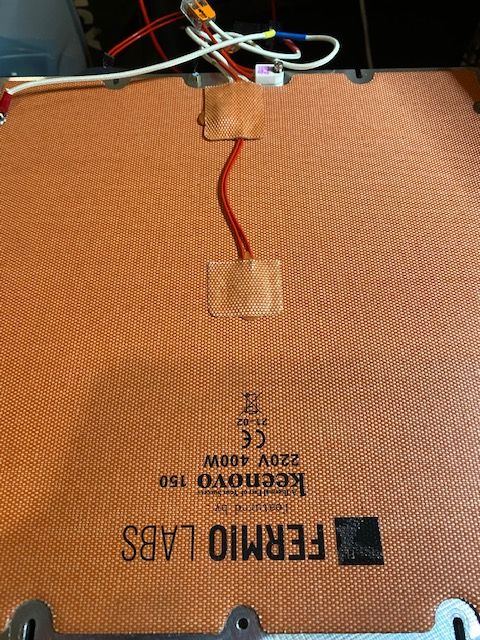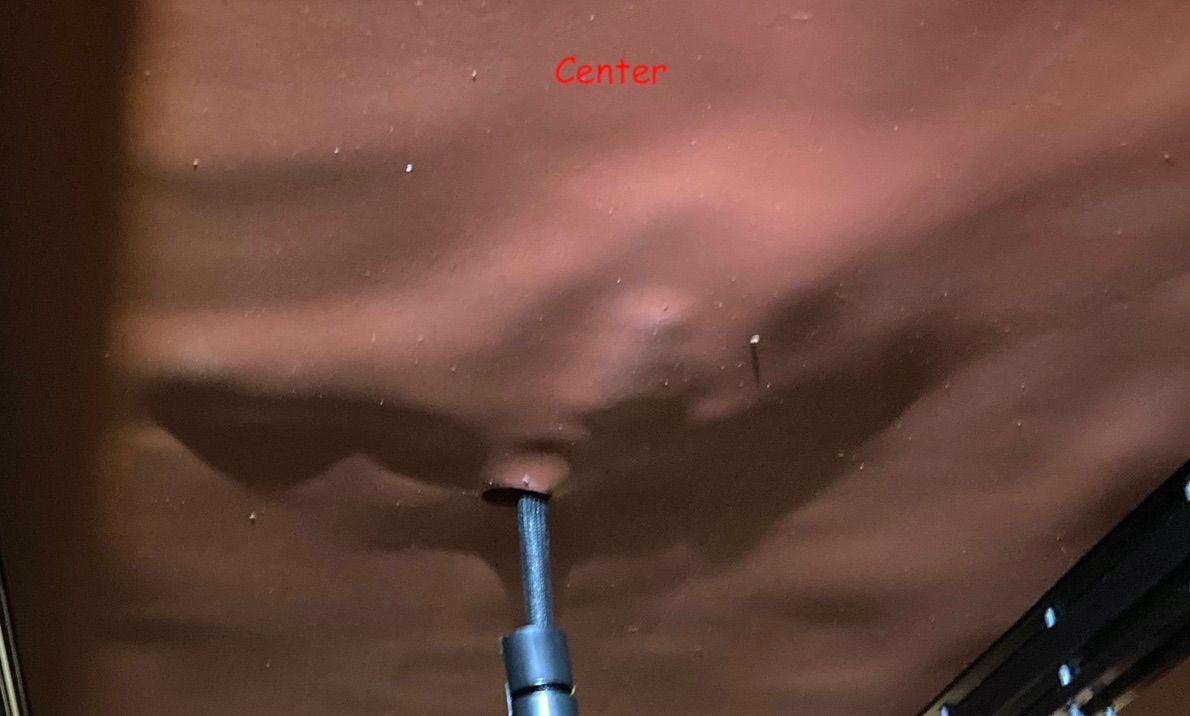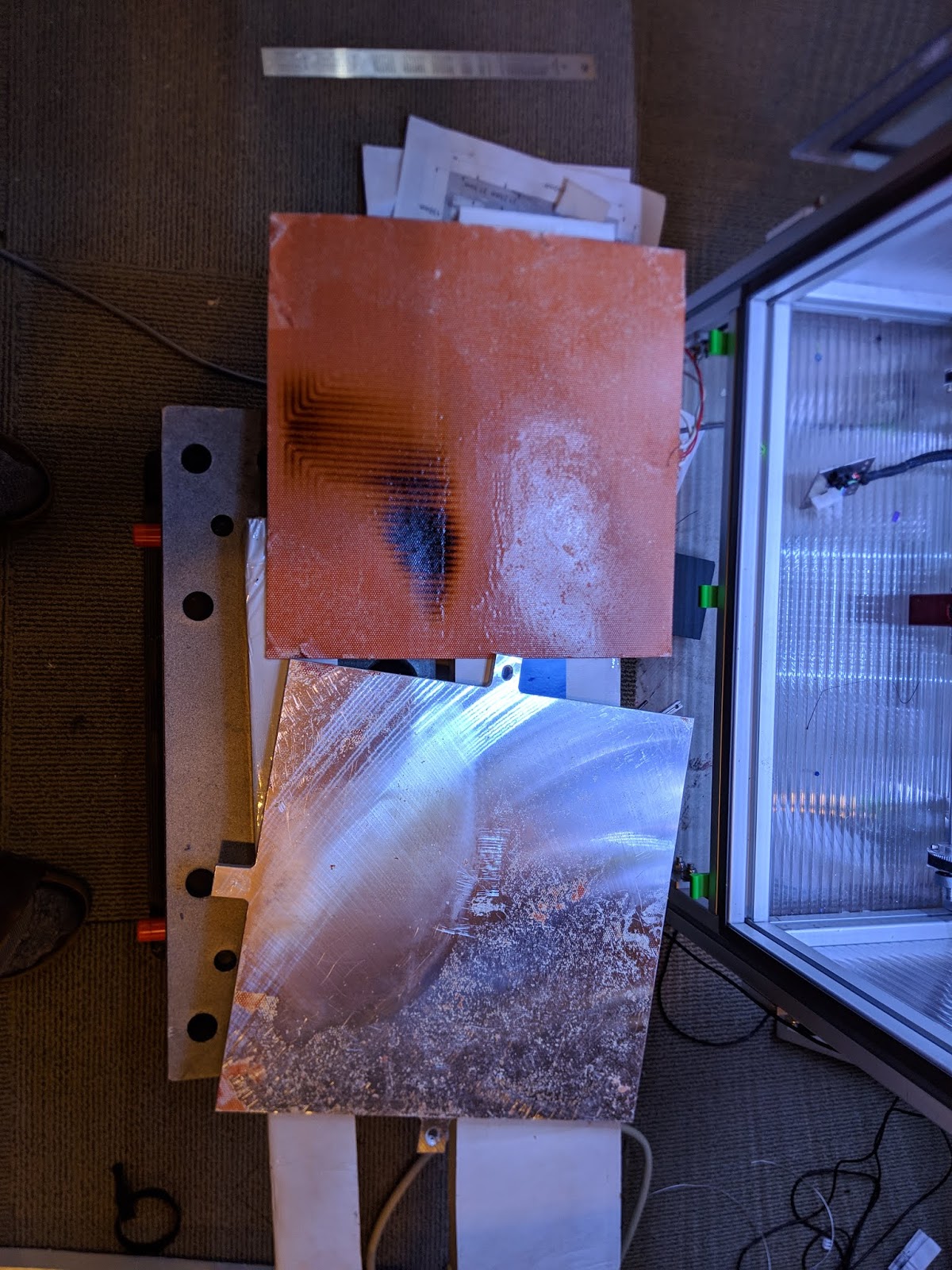[3.4.0rc1] I think the bed heater is overheating?
-
@phaedrux I'll have a look as soon as it cools down enough to touch. I'll take the bed off and see.
The graph looks fine otherwise though.
-
Was the bed heater attached by 3M adhesive sheet or with RTV silicone?
The 3M adhesive isn't a good option for high temps and will delaminate eventually.
-
@phaedrux It's some higher speced 3M adhesive as recommended from Fermio Labs
The mat and thermistor feels fine though, firm and set.

I'm going to remount the bed and do some tests. Glad I had the extra thermistor.
The PEI just rolled off.
-
Maybe so, but I'd still be more inclined to follow Keenovo's own recommendations.
edcf5a62-3a6a-41fb-8b45-2e4803a65975-User's-Manual-Keenovo-Flexible-Heaters.pdf User's-Manual-Keenovo-Flexible-Heaters.pdf
-
@phaedrux Yes, I have no knowledge of that myself so I have installed as Fermio has recommended it. When asked they say that the Keenovo recommendation is for general purpose usage in wet areas for heater tanks and other places not as pristine as inside a printer.
There will be a few thousand Vorons failing soon if the 3M adhesive doesn't hold up. Usually the RTV is only placed around the edges as a precaution. It will not stop the mat from loosen from the aluminium bed and cause thermistor misreadings if the adhesive fails.
Anyhow, that's a different discussion.
However, without knowing of even having thought much about it, I think that if the thermistor and mat would have losened from the bed it would've read a higher value than the actual bed as the energy cannot be absorbed by the metal and the thermistor is attached on top of the mat. Now, it read a lower value.
-
Well, Haven't been able to recreate anything suspicious at all.
What happened was strange, as the overwhelming smell of overheating glue and the self peeling PEI plus the extra bed end thermistor reading a value much to high. Never measured more than the set temperature before. Always 5 - 10C lower.
Anyway, as I can't recreat this it's probably for the best to close this thread.
-
@phaedrux said in [3.4.0rc1] I think the bed heater is overheating?:
Maybe so, but I'd still be more inclined to follow Keenovo's own recommendations.
Is the high temp RTV method preferred over that 3M double sided sheet? I have 3M as the main adhesive and RTV around, heating the bed up to 110C nominal.
-
@zapta said in [3.4.0rc1] I think the bed heater is overheating?:
@phaedrux said in [3.4.0rc1] I think the bed heater is overheating?:
Maybe so, but I'd still be more inclined to follow Keenovo's own recommendations.
Is the high temp RTV method preferred over that 3M double sided sheet? I have 3M as the main adhesive and RTV around, heating the bed up to 110C nominal.
It would be preferred for me. From the specs I've been able to find of the 3M sheet it's not really meant for long term high heat use or repeated heat cycling. Eventually it deteriorates. Adding RTV to the edges to seal them at least keeps them from peeling away, and perhaps through suction would keep the center from releasing.

Here the 3M has given way at the center of the mat. It's not a good design as there is no strain relief on the cabling and at temp the 3M has let go from the gentle pull of the cable.
There have been other cases where pockets have formed and the heater has burnt up from lack of contact causing hot spots.
Given the low cost of 500c RTV silicone ($10) why not?
-
@phaedrux said in [3.4.0rc1] I think the bed heater is overheating?:
Given the low cost of 500c RTV silicone ($10) why not?
Yes, it's sounds as the right thing to do. In my case I already have a bed with the 3M adhesive and RTV around the edges as you recommended in an old thread. Will add it to my TODO list. Not sure how easy it is to clean the existing RTV from the bed.
The reason I am looking into is is a thermal fuse blowout I had a few days ago. It's a 115C fuse with a bed I heat to 110C (originally I planned going only up to 100C). Everything looks good and I ordered a 135C thermal fuse but may go the full RTV route down the road.
-
@phaedrux Yes, you are of course right. More safety is never wrong. In my case I bought the variant which goes right to the edge and only leaves < 5mm either side.
If you want to go full RTV one have to either remove the 3M glue from the heater or buy the version without 3M tape.
I have this idea of making a thinish clamp in aluminium. Sort of a skeleton frame which is hold to place by small spring loaded screws in the extra three holes which the Voron beds usually have to be compatible with the 1.8/Trident models. It wouldn't have any other purpose than give some peace of mind and maybe a stress relief for the heater/thermistor cables.
Well, we'll see. It's not stupid expensive to send out for laser cutting.
-
@zapta said in [3.4.0rc1] I think the bed heater is overheating?:
Not sure how easy it is to clean the existing RTV from the bed.
Not easy. The 3M tape can be dissolved with a citrus oil solvent, but the RTV silicone would need to be cut away with a blade. Not likely worth the effort.
-
@phaedrux said in [3.4.0rc1] I think the bed heater is overheating?:
Not likely worth the effort.
I got a nice 250mm bed from a european vendors that doesn't ship anymore to the US. Will need to find another source.

-
@zapta Is it possible to attach a bed with only RTV? Why is this not the norm? The 3M adhesive kinda sucks for anything over 110 C. Does Keenovo deliver pads with no adhesive?
-
@Velvia said in [3.4.0rc1] I think the bed heater is overheating?:
Does Keenovo deliver pads with no adhesive?
You can custom order from them.
-
@Velvia, I read that this is the recommended way now, but I don't have any experience with it, my heater is attached with that 3M high temp adhesive. I just added RTF along the edges.
-
The bed plate acts as a heat sink/heat spreader for the heater. If part of the heater separates from the bed, that part gets extra hot. Here's what happens to the heater when the 3M adhesive starts to let go:
